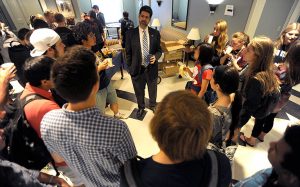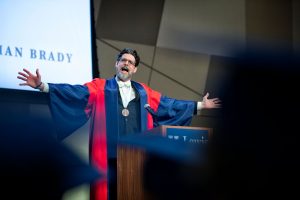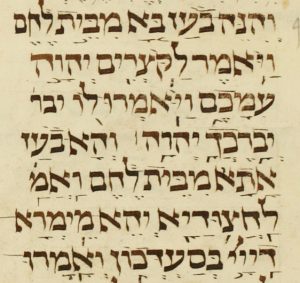Administration
My academic career began not only with teaching but administrative duties as well. I was the director of Jewish Studies for 6 years at Tulane University prior to becoming the director of the Tulane Honors Program. From 2006-16 I was the Dean of the Schreyer Honors College at Penn State and in 2017 I was named as the first TW Lewis Dean of the Lewis Honors College at the University of Kentucky. I was Interim Dean of the College of Arts & Sciences at the University of Kentucky from 2020-2022, returning to my position as Dean of the Lewis Honors College in July 2022. Both Jewish Studies and honors education require an effective administrator to reach across disciplines and units to build support and a successful program. This collaborative approach to leadership was vital in helping to prepare the College of Arts & Sciences for the new dean.

In the Tulane Jewish Studies Program, as in most of its kind, the faculty who taught in the program were in various other departments and maintaining a consistent and strong selection of courses required recruiting top faculty and convincing their department chair of the value of allowing their faculty member to teach a cross-listed course.
The situation in honors is similar, yet more comprehensive. Of the 350+ faculty who teach honors courses at Penn State, none are employed by the honors college, all had their “home” in another college and department. Because honors courses were never larger than 25 students, allowing the very best faculty in a department to teach an honors section meant a real, financial impact to the department as they would be required to hire another instructor to teach the general section. All honors advisors were also faculty members and that too required negotiation with home units as well as continued support and encouragement to the faculty who make the entire enterprise possible.

As dean of the Schreyer Honors College I also collaborated with all areas of the university beyond academics. The SHC manages its own admissions process, but also carries out an admissions strategy which required coordinating efforts with the University Admissions Office. There was a close relationship as well with student affairs and housing given the special living community for honors and various programming initiatives led by the SHC. Finally, I worked closely with the university’s central development office to raise funds for the SHC and other units; during my tenure we raised close to $80 million for honors education at Penn State.
The creation of the Lewis Honors College at the University of Kentucky has provided the exciting opportunity to build upon my knowledge and experience of 13 years in honors education. Beginning with the foundation of the University Honors Program and 7 staff members, over the first 18 months we recruited and hired a faculty and staff of 32 full-time employees, including 12 Lewis Lecturers, 5 academic advisors, and 5 personal counselors.
With the mission to “better the Commonwealth of Kentucky and the world by helping students explore their purpose, develop intellectually, and lead with integrity,” we have created the unique Center for Personal Development to partner with students in their exploration of purpose to cultivate self-awareness, wellbeing, and career readiness. A major task has also been to integrate Honors College curriculum into the curriculum of the university and other academic colleges. We have started upon a capital campaign with a goal of $50 million.
This sort of leadership is time consuming and collaborative yet I have found it to be incredibly rewarding. It also exemplifies university education at its finest, the entire community working together for the benefit of the students.
Research

My primary area of research is in biblical interpretation, specifically rabbinic interpretation of the Bible within Targumic literature. A “Targum” refers to the Jewish Aramaic rendering of the Hebrew Bible; it is a unique sort of translation. A Targum renders into Aramaic every word of the biblical text in its proper order, but often will add additional material, woven seamlessly into the newly formed text. My particular area of interest is how this additional material transforms the meaning of the biblical text in question.
I have written extensively on Targum Lamentations, including my doctoral thesis, “Targum Lamentations’ Reading of the Book of Lamentations” and the resulting book The Rabbinic Targum of Lamentations: Vindicating God. I have recently published a book on Targum Ruth, The Proselyte and the Prophet: Character Development in Targum Ruth. Both of these works are part of a larger interest in the Targumim of the Megilloth.
The basis of rabbinic exegesis, such as the Targumim and midrashim, is of course the biblical text itself. I continue work and research in biblical studies while most of my publications are in the area of rabbinic literature. Additional areas of research include the Dead Sea Scrolls and the so-called “historical Jesus.”
My most recent work is on “theodicy,” the question of divine justice and mercy. My academic interest in the area began with my doctoral research on the Book of Lamentations and examining Jewish and Christian responses to loss and catastrophe. Personal loss, of course, demands a reexamination. This book project, Beautiful and Terrible Things: Biblical Honesty About Suffering and Grace, was published by Westminster John Knox Press in September 2020.
